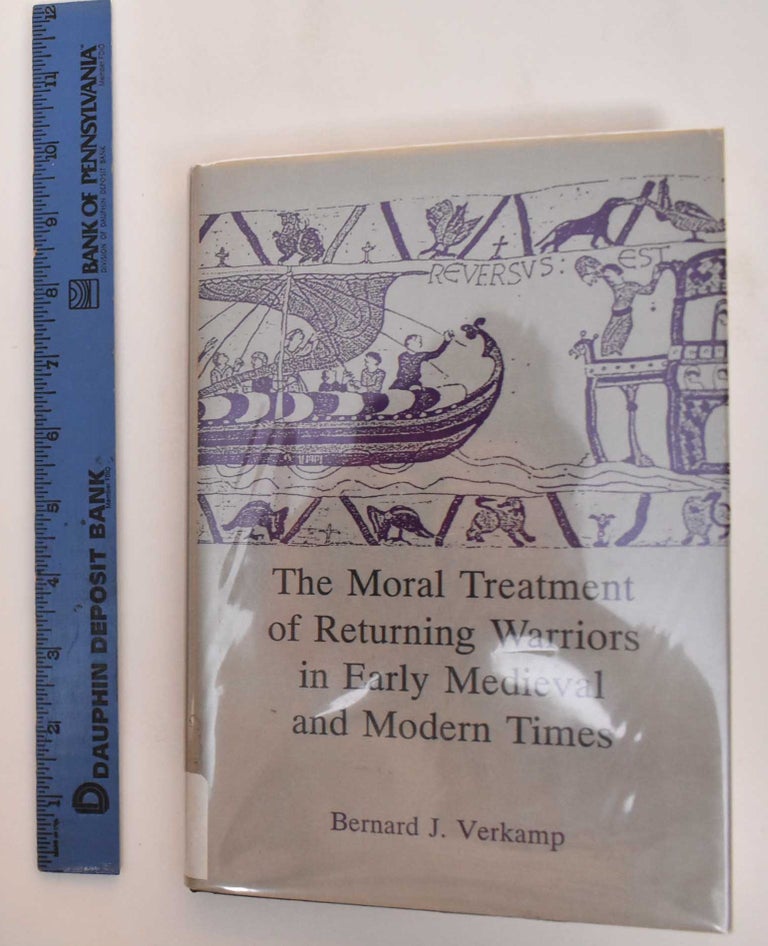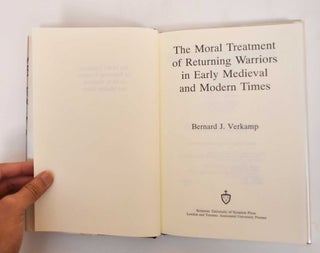The Moral Treatment of Returning Warriors in Early Medieval and Modern Times
Scranton / London: University of Scranton Press / Associated University Press, 1993. Hardcover. Black cloth boards with gilt spine lettering; gray and white dust jacket illustrated in purple with black lettering; 195 pp. VG/VG (ex-library with labels and stamps on spine, block, inside front and rear covers and title page verso. Pages are crisp and clean. Binding is tight.). Item #184506
ISBN: 9780940866225
"This work is the first book-length study devoted exclusively to a scholarly and systematic analysis of how soldiers returning from battle have been, or should be, treated morally. Long-scattered historical material is pulled together from a variety of sources to show why and how the early medieval custom of imposing penances on returning warriors first originated, and then, by the end of the Middle Ages, had lasped into disuse. The book is not an antiquarian exercise. Its interest in the past is motivated by a concern about the present and future treatment of soldiers coming home from war. The early medieval penitential practice is used as a background against which to bring into sharper focus the way modern society, under the influence of the Nietzschean aesthetic rebellion, has generally chosen to ignore the moral pain felt by soldiers returning from modern warfare, by lumping their feelings of guilt and shame together with other symptoms of war neurosis, like the "post-traumatic stress disorder" of Vietnam veterans.Bernard J. Verkamp challenges the modern therapeutic assumption that the moral pain felt by the returning soldiers can be "cured" like any other neurotic symptom through a process of "recalling" and eventual "forgetting" of subconscious, irrational, motivational factors. The thinking of modern theologians and philosophers like Reinhold Niebuhr, Paul Ramsey, James Childress, and Michael Walzer, is reviewed to show - generally within the context of the just-war tradition - how soldiers returning from modern warfare might still have good reason to experience an "uneasy conscience," regret the compromise of a prima facie duty of non-maleficence, grieve over the tragic dimension of one's "loving" defense of country, or feel polluted by the necessity of "dirtying one's hands."On the assumption that the returning soldier's moral pain might actually enjoy a rational basis, and be something other than neurotic, the book goes on to suggest how, through reconsideration of the early medieval custom of imposing penances on returning warriors, modern society can find both religious and secular alternatives to the therapeutic treatment of the guilt and shame so common among veterans of modern warfare.The Moral Treatment of Returning Warriors in Early Medieval and Modern Times eschews any Romantic nostalgia for the "age of chivalry"; the author disclaims any interest in reviving wholesale a ritual that could only work in a theocratic society such as prevailed in early Christendom. Viewed within the context of their original rationale, however, certain aspects or dimensions of the initial ritual are shown to be capable of accommodation of modern times along both religious and secular lines, and contributing thereby to the genuine reintegration of soldiers by the society that sent them off to war in the first place."- dust jacket.
OCLC: 27217035
Sorry, this book is not available.
Notify me when this comes back in stock.




